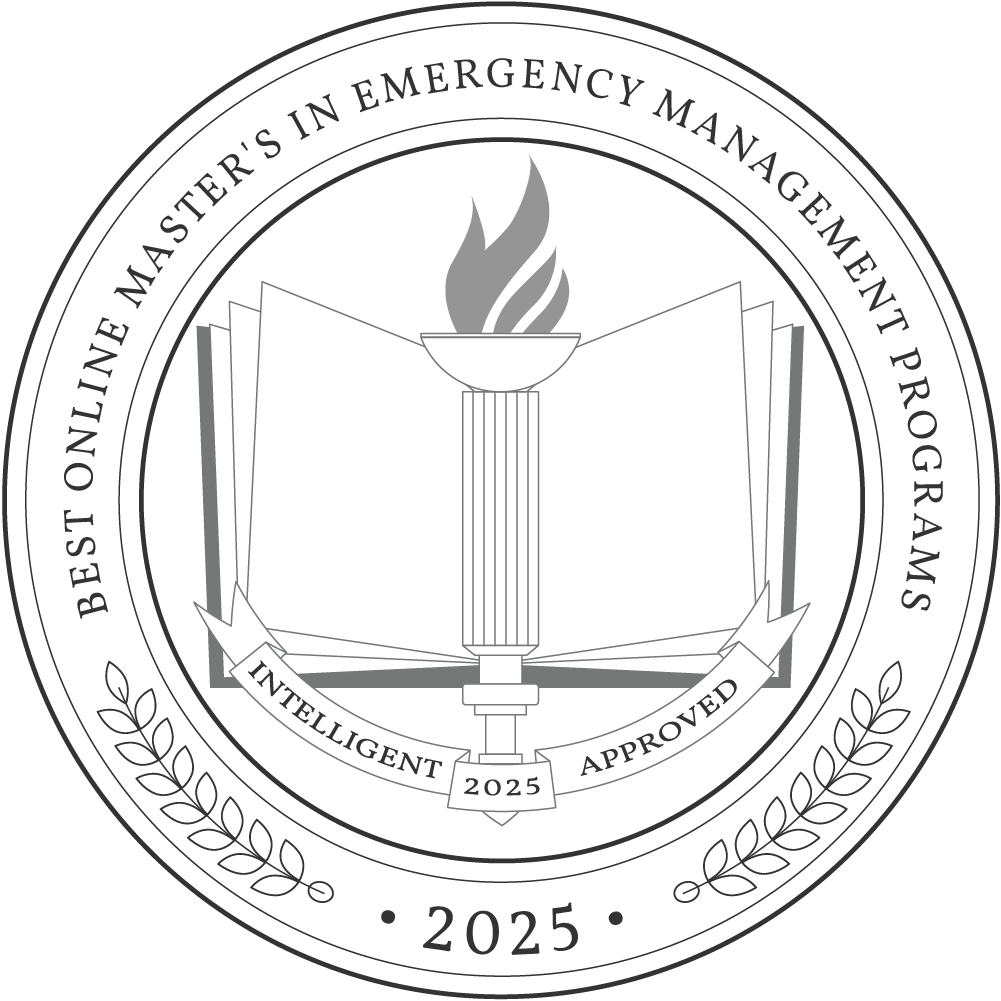Students in an online master’s in emergency management program explore how disasters impact communities, the environment, and finances. The curriculum equips them to build and apply emergency response plans and policies to recover from these events and mitigate damage.
Graduates work for federal, state, or local governments, private companies, and nonprofit organizations as emergency management directors, medical or health service managers, consultants, logisticians, operations specialists, and training coordinators. The Bureau of Labor Statistics predicts jobs for emergency management directors will increase by 3% through 2032. These professionals earn a median yearly salary of $79,180.
Specific costs of an online master’s in emergency management differ for schools due to institution status (private versus public), program duration, and additional fees. According to the National Center for Education Statistics, the average graduate tuition is $12,596 at public colleges and $28,017 at private institutions.
We interviewed Michelle Pickett, director of Northern Illinois University’s Academic Advising Center, for her insights on finding the right master’s in emergency management degree program and succeeding in an online learning environment.
Why Trust Us
The Intelligent.com Higher Education Team is dedicated to providing students with independent, equitable school and program rankings and well-researched resources. Our expert-driven articles cover topics related to online colleges and programs, paying for school, and career outlooks. We use data from the U.S. Department of Education’s College Scorecard, the National Center for Education Statistics, and other reputable educational and professional organizations. Our academic advisory team reviews content and verifies accuracy throughout the year for the most current information. Partnerships do not influence rankings or editorial decisions.
- Analyzed over 2,000 national, accredited, and nonprofit colleges and universities
- 800+ rankings pages are reviewed and updated yearly
- Content is informed by reputable sources, surveys, and interviews with academic advisors and other experts
- Over 100 data points are reviewed for accuracy and quality throughout the year, including sources
How we rank schools
Our list features the best online Emergency Management degree programs at top colleges nationwide. Each school featured is a nonprofit, accredited institution — either public or private — with a high standard of academic quality for post-secondary institutions.
We evaluated each school’s program on tuition costs, admission, retention and graduation rates, faculty, reputation, and the student resources provided for online students. We collected data from trusted sources like the National Center for Education Statistics, individual school and program websites, school admissions counselors, and other data sources. Then, we calculated the Intelligent Score on a scale of 0 to 100 based on the following criterion:
Academic Quality:
- Admission rate versus enrollment rate
- Retention rate of students who return after year one
- Accreditation status (regional and programmatic)
- Nonprofit status, both private and public institutions
Graduation Rate
- Overall graduation rate
- Total number of currently enrolled students, including diversity metrics
- Student-to-faculty ratio
Cost and ROI
- In-state and out-of-state per-credit tuition rates and fees
- Required credits to graduate
- Earning potential after graduation
- Availability of federal student loans, scholarships, and other financial aid options
Student Resources
- Available student services for online-only and hybrid programs
- On-campus amenities like tutoring centers and the number of libraries
Read more about our ranking methodology.
Best 23 Online Master’s in Emergency Management Programs
FiltersInstitution Type
Status
- Intelligent Score
- Alphabetically By University Name
- Acceptance Rate
- Enrollment
- In-state Graduate Tuition
- Out-of-state Graduate Tuition
- In-state Undergraduate Tuition
- Out-of-state Undergraduate Tuition

Arizona State University
Intelligent Score: 99.89In-state: $10,710
Out-of-state: $28,800
In-state: $11,720
Out-of-state: $11,720
SAT: 1100-1320
ACT: 21-28
$576
Online
Higher Learning Commission
33

Arkansas State University
Intelligent Score: 98.86In-state: $5,232
Out-of-state: $10,800
In-state: $4,986
Out-of-state: $4,986
SAT: 1000-1220
ACT: 20-26
$340
Online
Council for the Accreditation of Emergency Management and Homeland Security Education
36

Georgetown University
Intelligent Score: 95.61In-state: $57,384
Out-of-state: $57,384
In-state: $53,136
Out-of-state: $53,136
SAT: 1380-1550
ACT: 31-35
$1,620
Online, On-Campus
Middle States Commission on Higher Education
33

National University
Intelligent Score: 94.22In-state: $13,320
Out-of-state: $13,320
In-state: $15,480
Out-of-state: $15,480
SAT: N/A
ACT: N/A
$442
Online, On-Campus
Western Association of Schools and Colleges Senior College and University Commission
36

Adelphi University
Intelligent Score: 92.97In-state: $39,820
Out-of-state: $39,820
In-state: $42,450
Out-of-state: $42,450
SAT: 1060-1250
ACT: 21-27
$865
Online
Middle States Commission on Higher Education
33

CUNY John Jay College of Criminal Justice
Intelligent Score: 92.43In-state: $6,930
Out-of-state: $14,880
In-state: $11,090
Out-of-state: $11,090
SAT: 1170-1340
ACT: 25-31
Resident: $470
Non-Resident: $565
Online
Middle States Commission on Higher Education
36

Nova Southeastern University
Intelligent Score: 91.65In-state: $32,370
Out-of-state: $32,370
In-state: $20,618
Out-of-state: $20,618
SAT: 1030-1240
ACT: 20-27
$647
Online, On-Campus
Southern Association of Colleges and Schools Commission on Colleges
36

Jacksonville State University
Intelligent Score: 89.54In-state: $9,720
Out-of-state: $19,440
In-state: $9,600
Out-of-state: $9,600
SAT: 840-1070
ACT: 18-24
$422
Online
Southern Association of Colleges and Schools Commission on Colleges
30

Virginia Commonwealth University
Intelligent Score: 89.08In-state: $12,179
Out-of-state: $32,827
In-state: $12,703
Out-of-state: $12,703
SAT: 1060-1250
ACT: 21-28
In-State: $799
Out-of-State: $1,568
Online
Southern Association of Colleges and Schools Commission on Colleges
36

Liberty University
Intelligent Score: 87.45In-state: $14,791
Out-of-state: $14,791
In-state: $7,935
Out-of-state: $7,935
SAT: 1040-1250
ACT: 21-29
$565
Online
Southern Association of Colleges and Schools Commission on Colleges
36

Millersville University
Intelligent Score: 87.43In-state: $9,570
Out-of-state: $19,290
In-state: $9,288
Out-of-state: $9,288
SAT: 1000-1190
ACT: N/A
$605
Online
Middle States Commission on Higher Education
30

Lander University
Intelligent Score: 87.32In-state: $10,700
Out-of-state: $20,300
In-state: $8,856
Out-of-state: $8,856
SAT: 920-1110
ACT: 16-22
$545
Online
Southern Association of Colleges and Schools Commission on Colleges
31

University of Nevada, Las Vegas
Intelligent Score: 86.81In-state: $25,749
Out-of-state: $42,291
In-state: $36,629
Out-of-state: $36,629
SAT: 1000-1220
ACT: 18-24
$344
Online
Northwest Commission on Colleges and Universities
36

Southern New Hampshire University
Intelligent Score: 86.21In-state: $9,600
Out-of-state: $9,600
In-state: $18,810
Out-of-state: $18,810
SAT: N/A
ACT: N/A
$637
Online
New England Commission of Higher Education
36

Anna Maria College
Intelligent Score: 85.20In-state: $36,920
Out-of-state: $36,920
In-state: $10,530
Out-of-state: $10,530
SAT: N/A
ACT: N/A
$599
Hybrid
New England Commission of Higher Education
31-36

University of Alaska Fairbanks
Intelligent Score: 85.06In-state: $27,590
Out-of-state: $44,590
In-state: $29,182
Out-of-state: $29,182
SAT: 1110-1360
ACT: 17-27
$539
Online
Northwest Commission on Colleges and Universities
30

Arkansas Tech University
Intelligent Score: 84.93In-state: $5,568
Out-of-state: $11,136
In-state: $5,256
Out-of-state: $5,256
SAT: N/A
ACT: N/A
$315
Online, On-Campus, Hybrid
Higher Learning Commission
36

Eastern Kentucky University
Intelligent Score: 84.33In-state: $9,266
Out-of-state: $19,338
In-state: $9,900
Out-of-state: $9,900
SAT: 950-1170
ACT: 19-25
$636
Online
Southern Association of Colleges and Schools Commission on Colleges
36
How to Choose an Online Master’s in Emergency Management Program
Choose your area of study
Clarifying your educational and career goals early in the research process can be helpful, as it will enable you to set parameters for the type of program and experience you’re seeking.
“Researching the growth opportunities for a career is important,” says Pickett. “One helpful resource is the Bureau of Labor Statistics’s Occupational Outlook Handbook, which provides a wealth of career information, including the career outlook and educational preparation needed for different occupations.”
Within the field of emergency management, there are a number of concentration options available, including public health and safety, homeland security, information systems, law enforcement, logistics, and fire protection. Establishing what specialization, if any, you’d like to focus on will help you narrow your search to programs that offer that option.
Students can earn several types of degrees in emergency management, including Master of Science (MS), Master of Arts (MA), and Master of Public Administration (MPA). Each type of degree varies slightly in its theoretical and practical approaches to the curriculum as well as its graduation requirements, such as a thesis or capstone project.
Research schools and programs
You should only consider institutions that have been approved by a DOE-recognized regional accrediting organization, such as the New England Commission of Higher Education or Northwest Commission on Colleges and Universities. These organizations evaluate schools to ensure they provide students with a high-quality education. Those who attend a school that isn’t regionally accredited may be unable to access financial aid or transfer credits to another institution if needed.
Ideally, your master’s in emergency management program will be accredited by a respected industry group like the Council for the Accreditation of Emergency Management Education (CAEME) as well.
Create a list of questions about the schools and programs you’re considering, including:
- What is the program’s curriculum, and does it align with your interests and goals?
- What are the experiential learning requirements, if any?
- What support services do online students have access to?
- Who are the faculty, and what are their qualifications?
- How do online students interact with classmates and faculty?
- Is a field study or capstone project necessary?
Most schools will publish this information on their websites. Students can also learn more and get questions answered by attending virtual open houses and information sessions, contacting program representatives and admissions counselors, and following schools and programs on social media.
Prepare for tests and applications
Confirm the application requirements, procedures, and deadlines with an admissions counselor before starting your application. Requirements may vary by school, but in general, applicants to an online master’s in emergency management program will be expected to have a bachelor’s degree and a minimum undergraduate GPA. Some programs may seek candidates with previous professional experience in emergency management or a related field.
A standard application packet includes:
- Completed application and fee
- Official transcripts from undergraduate institution
- Letters of recommendation from former or current professors, academic advisors, employers, and community or faith leaders
- Essay or personal statement
- Resume/CV
- GRE scores
Select your program
Once you’ve gathered all the necessary information, consider the following factors:
- The program’s curriculum: Ensure that the curriculum aligns with personal needs and career objectives.
- The school’s culture and feeling of community: Does it seem like the faculty and staff will be supportive?
- Your budget: How affordable are the tuition, living expenses, and fees?
- The student-teacher ratio: A lower ratio means more likelihood of getting to know the teachers and getting help with coursework.
- Undergraduate prerequisite courses: Do you have the necessary prerequisite courses to be eligible for this program?
Based on these factors, students should narrow their list to the schools they’ll apply to. “Other areas to consider include the learning environment, class structure and teaching style, and cost,” says Pickett. “Some online programs may cost more compared to traditional ones due to the delivery fees for the online program.” There’s no right or wrong number of schools to apply to, but keep in mind that most schools charge application fees, which can quickly add up. Students who intend to apply to multiple schools should budget accordingly.
Before making your final decision, review your needs and goals again. Do you plan to attend school full-time or part-time? Are you only interested in 100% online programs, or are you fine with a hybrid program that has some in-person requirements? Some programs offer asynchronous courses, which can be completed at your own pace, while others only offer synchronous courses, which involve remotely attending lectures and completing assignments at the same time as other students — which of these two online learning formats do you prefer? Your school should accommodate your scheduling needs and learning preferences.
Determine how you’ll pay for your degree
Before taking out private loans, review every financial aid option, including federal loans, grants, fellowships, assistantships, scholarships, and work-study. Complete the FAFSA form for financial aid eligibility. After the form is assessed, depending on the level of income, you might qualify for income-based grants. If you’re currently working in the field, see if your employer offers tuition assistance. High academic achievers and extracurricular activities participants might qualify for merit-based aid for tuition in addition to income-based funds in the same school year.
Be sure to speak to financial aid counselors at the schools you’re interested in for the most accurate and specific information about program cost.
What Can You Expect from an Online Master’s in Emergency Management Program?
A standard master’s in emergency management program requires 35 to 40 credit hours, which full-time students normally complete in two years. Part-time students may take longer to complete this degree.
Core courses in a master’s in emergency management degree include ethics, critical decision-making, risk assessment, public health implications of disasters, disaster recovery, and theory of emergency management. Students learn skills in leadership, communication, management, emergency planning, critical thinking analysis, and global awareness. They dedicate much of their time to real-world case studies where they plan for possible emergencies and disasters.
Some programs may offer a more general curriculum, while others include specializations in areas like homeland security, public safety, or fire science.
Many emergency management degree programs require a capstone project or thesis at the program’s end. A capstone project allows students to draw on the knowledge and skills attained from prior coursework and design a comprehensive plan with real-world applications. A thesis is a research-based paper focusing on a theory or practice related to emergency management. Programs may also require a practicum or internship in an emergency management setting.
Potential courses you’ll take in an online master’s in emergency management degree program
- Community Collaboration. The course presents an overview of how communities respond to disaster situations.
- Disaster Planning. The class focuses on how to prepare and deal with the aftermath of a disaster competently.
- Threat Management. In this class, students will learn about common threats and their proper assessment.
- Practical Application. The class deals with real-life scenarios and functions as a type of internship.
- Homeland Security. The course gives students a basic understanding of what the U.S. Department of Homeland Security does.
What Can You Do With an Online Master’s Degree in Emergency Management?
Career outlook
A background in emergency management prepares you for a career in business, healthcare, or public administration. Cities and urban infrastructures require emergency management to preserve operations if disaster strikes. Corporations often employ these professionals to ensure the business can continue to operate and mitigate losses in an emergency situation.
Here are a few of the top career options in emergency management:
- Emergency management director — Prepare plans and coordinate responses for emergencies and natural disasters.
- Median annual salary: $79,180
- Projected employment growth (through 2032): 3%
- New job openings projected: 900 annually
- Health services manager — Manage the administrative aspects of a healthcare practice or department.
- Median annual salary: $104,830
- Projected employment growth (through 2032): 28%
- New job openings projected: 54,700 annually
- Fire inspector — Investigate the causes of fires, detect fire hazards, and help organizations ensure compliance with fire codes.
- Median annual salary: $65,800
- Projected employment growth (through 2032): 5%
- New job openings projected: 1,600 annually
Online Master’s in Emergency Management Degree Frequently Asked Questions
How do I apply to an online master’s in emergency management degree program?
Most schools accept applications and supplemental materials electronically. An admissions counselor can provide application requirement details and confirm application due dates.
Gather the following materials:
- Official transcripts from your previous school by contacting their registrar’s office
- Two to three letters of recommendation from academics and professionals who know you well
- Test scores from the GRE or other standardized tests as required
- Resume or CV highlighting the skills and experiences most relevant to the program
- Graduate school essay for the admissions committee to get to know you better and understand your motivations for pursuing a degree
How much does an online master’s degree in emergency management cost?
This will vary based on factors unique to the student and the school. The National Center for Education Statistics (NCES) reports that the average tuition for graduate programs is $28,017 at private institutions and $12,596 at public universities.
However, students should also budget for additional costs besides tuition, including school-assessed fees for technical and academic support services, a reliable computer and internet, books, and other school supplies.
How long does it take to earn an online master’s in emergency management degree?
The total number of required credits ultimately determines how long it takes to complete an online master’s in emergency management. A 35-40 credit program typically takes full-time students two years to complete. However, several factors can lengthen or shorten that time.
“Students considering enrolling in an online college should ensure that they’re focused and motivated and can practice good time management and self-discipline skills, especially for self-paced programs,” Pickett advises.
Is an online master’s in emergency management degree worth it?
A master’s degree is generally required for those who wish to take on management or director-level positions. This increase in responsibilities also opens up higher salary opportunities.
Obtaining an online master’s degree in emergency management isn’t just about the paycheck. Your experiences and connections in graduate school can also lead to a higher degree of work satisfaction, as the research and internship opportunities may help you discover the particular niche in this field that best suits you.
The remote environment that comes with an online master’s in emergency management degree fosters a higher level of self-discipline, time management, and organization — all of which are critical to success in this field.
Learn More About Emergency Management Degrees
Compare School Options
Related Degrees
- Construction Management
- Business
- Organizational Leadership
- Small Business Management
- Business Administration
- Information Systems Management
- Risk Management
- Economics
- Hospitality Management
- Sports Management


